Stop that sleep regression and get baby back to sleeping! Learn all about the 8 month sleep regression and why it can happen at 9-10 months, also. Learn 8 common causes for the regression and what to do about each. Find out the common age for a sleep regression in this age range and how long it will be around.
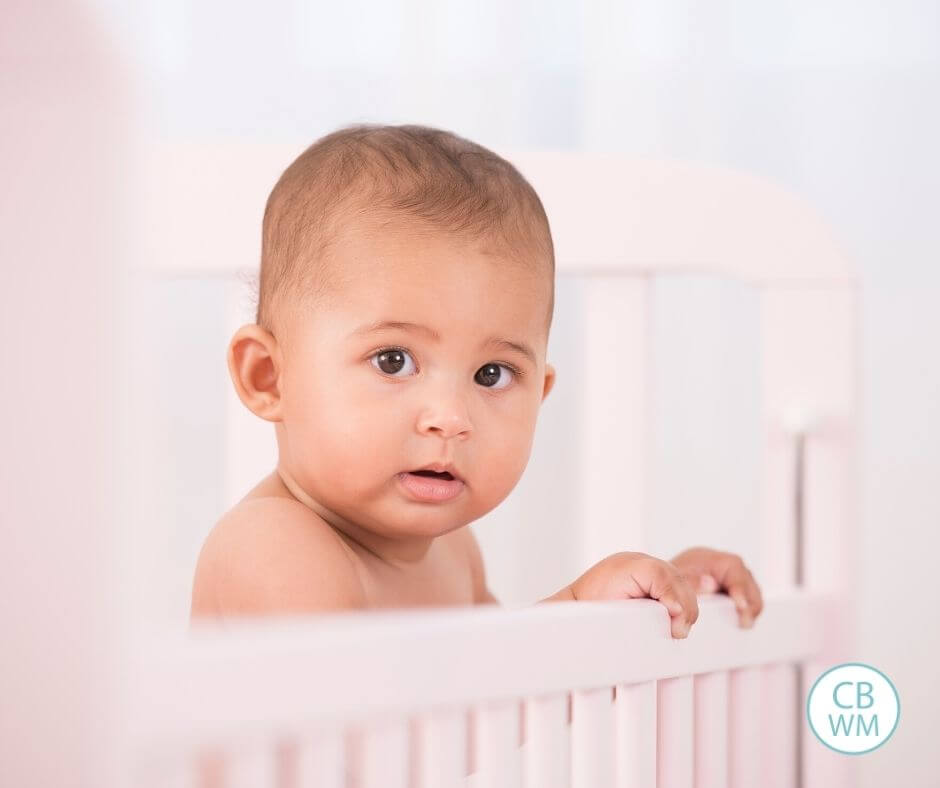
While the 8-10 month sleep regression is not as infamous as the 4 month sleep regression, the sleep troubles that come up at this age are well documented and always noticed.
One day you will find yourself thinking, “Why is my 10 month old fighting naps?” Or perhaps you have an 8 month old waking at night crying. Well, it is likely a good old sleep regression.
With a 3 month long sleep regression, it is easy to understand why this sleep regression gets noticed.
In this post, we will talk about when this sleep regression happens, why it happens, and what to do about it.
Post Contents
- When Is the 8-10 Month Sleep Regression
- How Long is the 8-10 Month Old Sleep Regression
- Causes for this Sleep Trouble
- How To Fix the 8-10 Month Regression
- New Skills
- Teething
- Separation Anxiety
- Schedule Change Needed
- Language Explosion
- Mental and Physical Stimulation
- Wonder Week
- Sun
- Conclusion
- Frequently Asked Questions
- How long does 8 month sleep regression last? How long does 10 month old sleep regression last?
- Why is my 8 month old not sleeping anymore?
- Why is my 8 month old crying but not awake?
- How many naps should an 8 month old baby have?
- Why is my 10 month old waking every hour?
- Related Posts
When Is the 8-10 Month Sleep Regression
This sleep regression can happen anytime between 8-10 months old. That is a long time!
Ideally you will just face one sleep regression during this time period, however, as you will see in the causes below, there are many reasons for it, so you really could get one right after the other.
So yes, there is an 8-month sleep regression, yes there is a 9 month sleep regression, and yes, there is a 10 month sleep regression. You might experience just one or maybe 3 (or more!).
Unlike your Wonder Week 19, not all babies will hit this sleep disturbance in the same range, even if the cause is the same.
For example, if your baby and your neighbor’s baby both have sleep interrupted for teething, one baby might be hit at 8 months old while your neighbor’s baby might be at 10.5 months old. So one baby might be a 10-month sleep regression while another is a 9-month sleep regression.
How Long is the 8-10 Month Old Sleep Regression
The length of this sleep disruption will vary widely depending on what is causing it.
It could be as short as a day or two, or it could feel like it is lasting several months if you get multiple causes lined up.
Causes for this Sleep Trouble
There is always a reason why your baby is not sleeping well. Baby sleep doesn’t just happen, but it also doesn’t just go away. Common causes of baby sleep problems at this age include:
- New skills (developmental milestones being met)
- Teething
- Separation anxiety
- Schedule change needed
- Language explosion
- Mental and physical stimulation levels
- Wonder week
- Sun
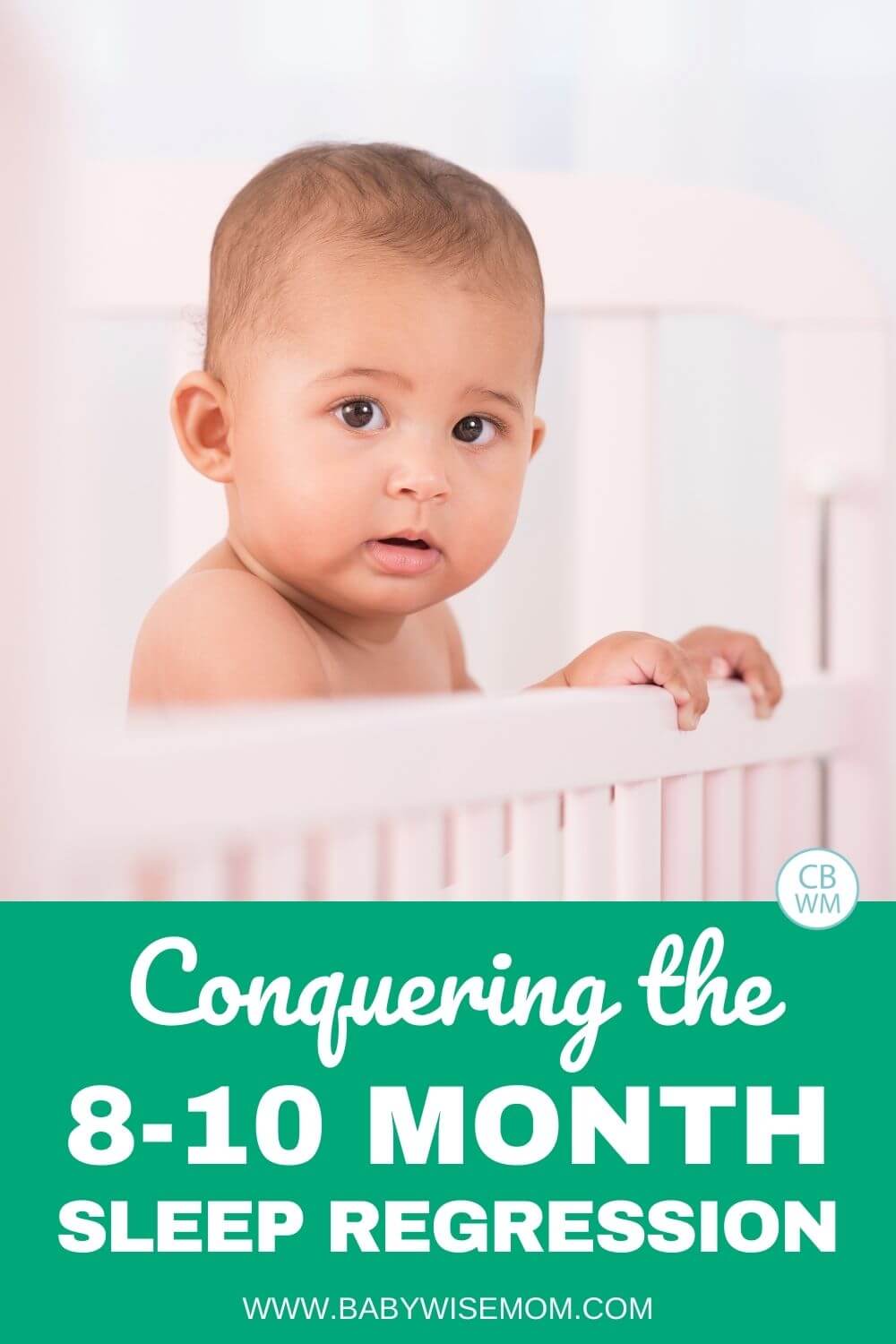
How To Fix the 8-10 Month Regression
Let’s discuss each of the causes and what you can do as the parent to help your little one sleep better and stop the night waking or short naps.
When you are trying to solve these sleep issues, you want to find the reason for the poor sleep and address it if you can. You can’t fix the problem if you don’t address the culprit for the problem.
New Skills
When babies learn new skills, sleep gets disrupted. This has been happening for months now, so it is nothing new to you.
If your little one is not napping and you see that he is constantly practicing a certain skill during “nap time,” there is a good chance this is the cause of your poor sleep.
One interesting note is that not all babies are disrupted with every new skill. Some will only become disrupted in sleep with just one of the new skills they develop.
Physical milestones really explode during this time, so you have a lot of opportunity for sleep disruptions.
Your baby might be starting to crawl and have newfound mobility. Your baby might be working on the pincer grasp.
Your child is learning so much and might find nap time a great time to really practice this new ability.
One of the best things to do when this happens is to practice the skill a lot during playtime. So if your little one is scooting or cruising around the crib through the afternoon nap, address that during play time.
This is so common that I have an entire post dedicated to it. Read up on How to Stop New Skills from Disrupting Naps and Sleep here.
Teething
A super common cause of sleep troubles at this age is teething.
If you notice a lot of fussiness or crankiness during wake time and also during what is supposed to be sleep time, there is a good chance new teeth coming in is causing sleep trouble.
The good news is that typically, babies do not get disrupted with every single tooth. You will typically see the first one cause trouble and then not again until canines or molars. You might get some if more than one tooth comes at once.
Some babies will be disrupted at least for a day or two with each tooth.
If your baby is chewing a lot, drooling, and has swollen or red gums, there is a good chance your baby is teething.
If teething pains are disrupting your baby’s sleep, you will want to do your best to alleviate the pain. Typically if you can mitigate the pain for a couple of days, that is all your baby will need.
Read up on options for relieving pain in these posts:
Separation Anxiety
This is a very normal part of development. All babies go through it to some extent.
If you notice your child getting upset every time you leave the room or move out of sight, then sleep troubles might be caused by separation anxiety. If your baby has major clinginess to you, you are probably going through this milestone.
When this is the case, you want to focus on helping your child learn the reality of object permanence as quickly as possible. This can be done by playing games like peek-a-boo.
It can be hard to stick to your nap schedule if your little one has tears at nap time. It is always good to be aware of setting habits for the future, but it is also okay to consider temporary mental leaps that interfere with sleep.
You always want to be careful you do not start habits that you do not want to continue long term, but sometimes you start something for a short term to get through a difficulty.
For more help on working through this, see How to Manage Separation Anxiety in Babies.
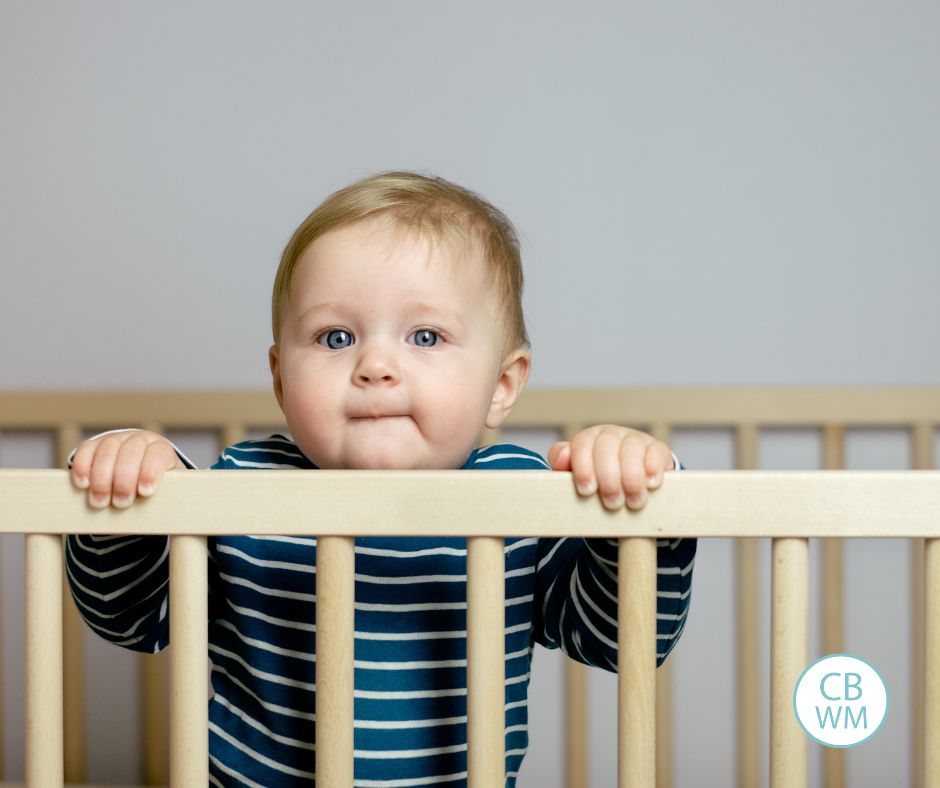
Schedule Change Needed
Any time your little one has sleep problems, it is wise to consider the need to change the schedule.
Your baby’s sleep schedule might need some tweaking. You might need to drop the 3rd nap and move to a 2 naps schedule. Most babies drop the third nap around 8 months old (though some are closer to the 10-month mark and some are more like 6 months).
This will probably lead to less overall daytime sleep, but baby might take longer daytime naps with the other two naps and end up with the same amount of daytime sleep. You might also need to move bedtime a little earlier, even just for a bit.
You might need to change awake time length. Your little one might be ready to stay awake a little longer between naps and have more hours of awake time in the day.
You might simply need to change up the sleep environment or your sleep routine. What worked when your kiddo was younger might not work now.
You might need to get a white noise machine now that your little one is more aware and curious.
You might need to get some black out curtains so your little one is not disrupted by light during daytime naps or woken by the sun in the morning.
If you have trouble with night sleep, make sure your bedtime routine is solid and sets the stage for sleep at night. Most babies do not need night feedings at this age, but always rule out hunger. You always want to be sure the baby is getting enough calories so waking isn’t from hunger.
You might need some sleep training if your little one cannot self-soothe or make it through the night. If you have not worked on solid sleep habits yet, now is the time to start.
If you have already done sleep training with your little one, brushing up will not be difficult. If you haven’t, it might take as little as a few days to a few weeks.
Being able to self-soothe is also vital for making it through nap transitions without waking up.
You might have some sleep props you need to consider getting rid of so baby can sleep independently.
Always remember how important consistency is, so make sure your 2 nap schedule is the same from day to day and that baby is eating every 3-4 hours. Wake baby up at the same time each morning and have a consistent bedtime.
It is easy at this point to start to slack on things since baby can handle more variance to the schedule.
One thing to note, if you move from 3 to 2 naps, you might need to have an earlier bedtime for a little while as your little one adjusts to the schedule change.
Language Explosion
This is related to new skills, but if your baby is having a language explosion, then talking will seem much more appealing than sleeping. Babbling must be done!
To help with this, talk with your baby as much as possible. Get that practice in during playtime.
Also, make sure your baby has enough stimulation as discussed below so he is tired and just wants to take a nap or go to bed.
Mental and Physical Stimulation
Your baby needs enough mental and physical stimulation each day in order to sleep well.
Make sure your baby is challenged mentally and physically. This becomes a common cause of sleep troubles around 10 months old.
With a baby, it is easy to increase both things. Simply putting your baby on the floor to play and getting some age-appropriate toys can do the trick.
Baby needs new, stimulating toys and to be exposed to more in the day. While you can still overstimulate a child this age, you are more likely to understimulate unless you are intentional with your time.
>>>Read: Importance of Exercise and Stimulation for Sleep
Wonder Week
Last but not least, the good old wonder week. There is a big wonder week that starts around 36 weeks old and can go until week 40. If your sleep problems happen in this range, there is a good chance it is simply the wonder week.
Remember that during your weeks in a wonder week, there is a lot happening with brain development. It is a normal thing and necessary for baby. The developmental leap isn’t fun, but it is normal and necessary.
Sun
Your baby might start to become more curious, which can lead to the sun to start to interfere with sleep. When the sun is up, baby knows people are up. This can lead to short naps, waking early in the morning, and/or baby taking a long time to fall asleep at night.
This is very easy to fix with blackout curtains. Read Blackout Curtains to Help Baby Sleep Better for more.
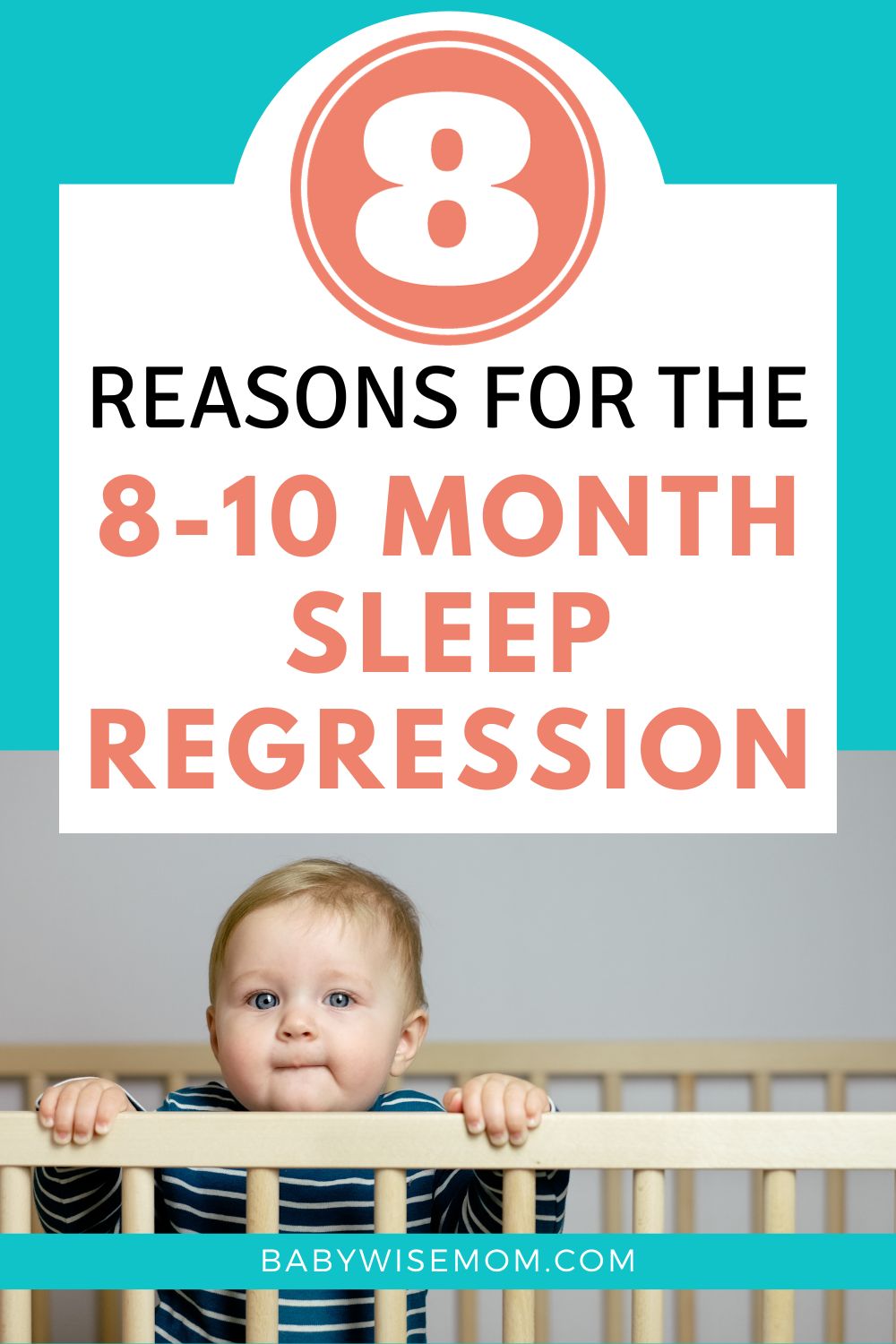
Conclusion
It is very normal to have a sleep regression at this age range. Take heart if you have the 8 month sleep regression or 10-month-old sleep regression going on. It is nothing to stress out about. You haven’t done anything wrong.
There are many things you can do to hopefully shorten the duration of the shorter nap or night wakings, but sometimes you basically have to wait it out. Do what you can, but don’t worry so much that you stop enjoying this time with your baby.
Following the steps in this post and understanding what is happening can help you have success as you navigate these sleep challenges.
Frequently Asked Questions
Here are some questions people frequently ask about sleep regressions at this age.
How long does 8 month sleep regression last? How long does 10 month old sleep regression last?
Sleep regression lengths can vary. You can expect anywhere from a few days to up to 6 weeks.
Why is my 8 month old not sleeping anymore?
There can be many reasons, but it is likely because 8-month-olds can have a sleep regression.
Your baby might need to move to two naps, might have separation anxiety, might have too many hours of sleep in the day, might have an illness or be teething, or might be moving around working on a new skill.
Why is my 8 month old crying but not awake?
This can be from sickness, teething, too hot, too cold, or perhaps even nightmares. It might also just be a phase.
How many naps should an 8 month old baby have?
8-month-old babies will have 2-3 naps a day. Your baby should be at 2 naps a day around 10 months old at the oldest.
Why is my 10 month old waking every hour?
If your baby is having disrupted nighttime sleep, you will want to identify and fix the WHY. A sleep regression should not cause waking every hour in the night, so look beyond a “phase” answer. Did you start a new habit that is interfering with sleep? Pain or sickness? Is your baby uncomfortable?
If your baby cannot fall asleep independently, you will want to do some sleep training so your baby can fall asleep without your assistance.
Related Posts
- Sleep Regression: Causes, Ages, and What to Do
- 10 Reasons Your 5-8 Month Old Stopped Sleeping Well
- The Wonder Weeks and Sleep
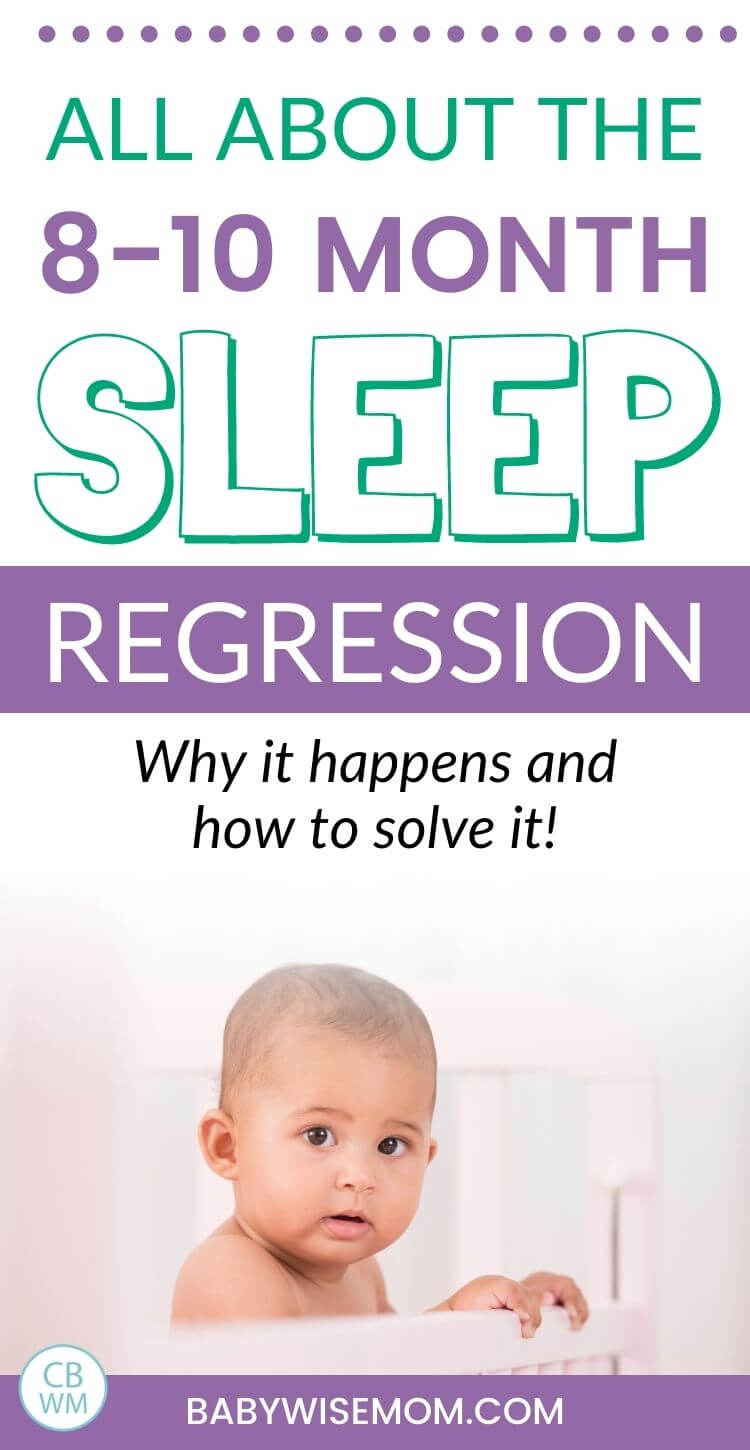
This post first appeared on this blog in January 2021

What if baby starts to fight bedtime/nighttime sleep but continues to take naps well without a fight? She previously slept through the night regularly, but now she also wakes one or two times at night. I’m confused. I try to do 2 naps a day, and 2 hours wake window, except after 2nd nap. She stays awake until bedtime, which could be 3-3.5 hours. She is happy to stay awake during this time until about 7:30. Bedtime used to be 8:30 or 9 with 3 naps. Now I can’t seem to move it earlier to 7:30 after two naps and lay down without a fight. Her day time routine seems to be going well. At her bedtime feeding at 7:30, she doesn’t feed very long. She is more interested in what’s going on around her, and though I continue to try to get her to feed, she refuses. When she wakes up at night, she usually seems hungry and wants to feed but then she is again difficult to lay back down. I usually lay her down and after about 5 mins of fuss, she self soothes. Why is she fighting me so much? I’m having a hard time figuring out where I’m going wrong! Sometimes after bedtime she may wake up once or twice not long after bed. I thought maybe tummy troubles with our uphill starting solids, but they continue even when we turn a corner on food. Is this just part of some of these challenges and this is our current optimum? Or is there something I should adjust?
This isn’t typical in a sleep regression for babies who have been sleeping through the night. If you have previously been treating 8:30 or 9 PM as bedtime, it may just be her internal clock being stuck there. You can shift things slowly to move bedtime earlier. If you live where there is a time change, the time change this weekend will help you out.
It is possible she is overly tired by bedtime since dropping the third nap.
I would make a list of your sleep routine and sleep environment for nap tie and for bedtime. See what is different and if you can replicate bedtime to be more like nap time. See also this: https://www.babywisemom.com/baby-waking-shortly-after-bedtime/
Hi! My 8 month old has been sleeping through the night since 8 weeks old with our babywise schedule (I used it on my now 2.5 y/o toddler as well!) and they’ve both been amazing sleepers. She takes 2 90 minute naps during the day, and is having 2.5-3hr wake windows during the day. I usually breastfeed her around 730-745 at night and she falls right to sleep after eating a significant amount. She’s been almost consistently waking up at 1am for about a month now! She is not super upset, but is awake and slightly fussy. I breastfeed her for a few minutes and she goes back down very easily. She has been full on crawling like crazy the past 3 weeks so not sure if that’s adding to it? I just want her to go back to sleeping through the night! Any suggestions?? It’s a minor problem, but I work so hard to keep her on schedule and don’t understand why she’s waking randomly.
I would try to get her to go back to slee without feeding her and see what happens. If she wakes 45-60 minutes later, she really is hungry. In that case, you would want to try to get more food into her in the day. If she sleeps all night, she is waking for some other reason. It could be the crawling, it could be too hot or cold, it could be some noise that happens that time of night…lots of possibilities. But I would rule out hunger first.
I’m a little concerned about my baby’s feedings. She was sleeping through the night between 4-7 months old, but for almost 3 months now she’s consistently been waking between 2-4am for a feeding. We’ve ruled out other reasons for waking (sleep regression causes, skill acquisition, Leap, etc). As soon as she’s fed, she goes right back to sleep. She’s generally a good sleeper (in her crib — but she refuses to nap anywhere else). She takes two naps a day (30-60 minutes in the morning and 1-2 hours in the afternoon). She nurses every time she wakes and also an early evening feed and one before bed (5 nursing sessions total) with 3 solid food feedings in between (breakfast/lunch/dinner with family). She’s mostly eating purees with oat cereal and rice teether crackers. Because she’s been smaller and we had some concerns about my milk supply when she was younger, I thought I’d reach out. I admit the nighttime feeds are fatiguing. It would be nice to sleep through the night again, haha! Thanks
Have you tried adding in some fruits and veggies? You didn’t say her age, but it sounds like she is probably old enough to eat things like cheese and yogurt, also, which can help get that fat in there.